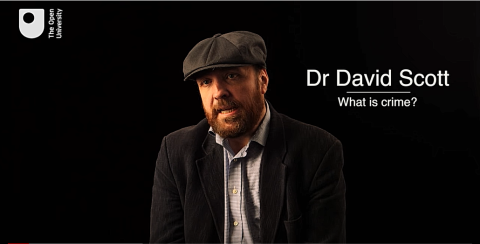What is Crime?

Watch Dr. David Scott discussing the question, What Is Crime?
Crime is an essentially contested concept. There is no universally agreed definition of what a crime is. However, the most straightforward way of thinking about crime is to look at it in terms of a legalistic perspective – from this approach a crime is an act which is illegal. It’s against the law. Specifically it is against the criminal law. In so doing the act will have certain aspects to it – it will have an aspect of criminal harm and it will have an aspect of criminal blame.
Interestingly though, many people have questioned this legalistic definition. First of all this is because it’s always going to be partial and determined within a very specific and limited set of criteria about what is crime. If a given act isn’t illegal, then whilst we might see it as wrong, or problematic or harmful, it’s not going to be something which will be defined as a crime. Many criminologists have argued that it is important to unpack the legal definition, and have questioned the very notions of what is and what isn’t criminal harm. Criminologists have also questioned notions around criminal blame and both the strengths and weaknesses of a backward looking approach grounded in individual culpability.
A number of criminologists have even gone as far to say that a crime is a statist category, i.e. that it’s defined by the state and it’s infused with certain interests, ideas and power relations which reflect the interests of the powerful. For these critics, the state defined categories of crime reflects the interests of those who have something to lose in society, where as at the same time it does not necessarily reflect the interests of those who are powerless or those at the bottom end of society.
Hence, the crime logic is seen as imposed and perhaps even a reconstruction of reality in legalistic and statist classifications. A crime something which is placed as a specific legal category, as a way of generating meanings and understandings and some criminologists (sometimes referred to as abolitionists) have argued that this is a problem in itself and that we shouldn’t necessarily even think about the logic of crime because using the language and logic of crime will lead those who are responding to it down certain pathways which may be considered solutions, such as punishment.
David Scott, The Open University.
